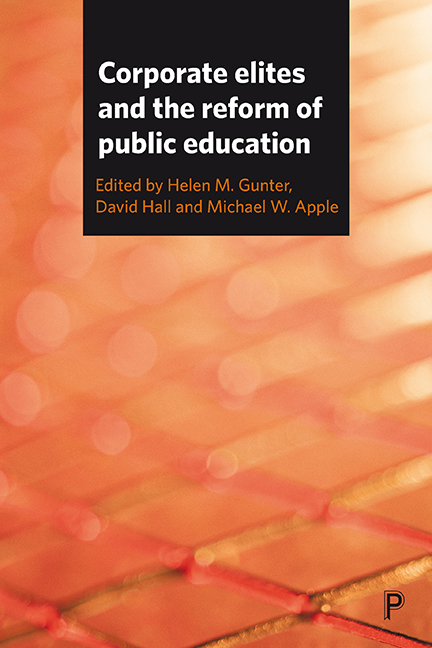Book contents
- Frontmatter
- Contents
- Foreword
- Notes on contributors
- Introduction: Scoping corporate elites and public education
- Part 1 Corporatised governance: system perspectives
- Part 2 Corporatised governance: provision perspectives
- Conclusion: The challenge of corporate elites and public education
- References
- Index
thirteen - Political and corporate elites and localised educational policy-making: the case of Kingswood Academy
Published online by Cambridge University Press: 05 April 2022
- Frontmatter
- Contents
- Foreword
- Notes on contributors
- Introduction: Scoping corporate elites and public education
- Part 1 Corporatised governance: system perspectives
- Part 2 Corporatised governance: provision perspectives
- Conclusion: The challenge of corporate elites and public education
- References
- Index
Summary
Introduction
The purpose of this chapter is to present data and analysis in order to theorise the role that both corporate and political elites played in the development and enactment of localised policy-making at Kingswood Academy, a secondary school in the north of England (anonymised name). The analysis offered here reveals how a single case-study school provides an important site to explore the ways in which the educational policy environment enables the conditions for elites to play a significant role in the development and delivery of localised policy processes in England.
The theorisation of this single case study speaks to and advances the findings of a range of studies in this volume and elsewhere (Apple, 2004; Rizvi and Lingard, 2010; Gunter, 2012; Ravitch, 2013a; Au and Ferrare, 2015). Notably, such research examines how and why globalised, marketised neoliberal approaches to education reform have led to ‘organisational recalibration’ (Ball, 2012a, p 94), where there are now visible multifaceted and multitudinal ‘policy entrepreneurs’ involved in public sector policy processes trading on and developing ‘various forms of social and network capital which translate into the right to speak and the necessity of being heard’ (Ball, 2012a, p 69).
In the case of Kingswood, there was a core triumvirate of policy entrepreneurs involved in a range of activities that will be described and analysed as an instantiation of how, through localised policy-making, political and corporate elites are influencing the field of education, not as incidental bystanders but as integral and central policy actors. In this sense, Kingswood's approach to localised policy-making is reflective of, and speaks to, the changing nature of educational provision in England and elsewhere, as the terrain is re-formed to privilege certain actors, networks, and ideological and political positions where a crucial tenet of the intended consequences is the privatisation of public assets and services.
The contribution is to offer an empirical account of how influence flows within a single network, thus identifying the essentialising and privileged nature that social capital plays in the exchange relations revealed through the work of policy entrepreneurs.
- Type
- Chapter
- Information
- Corporate Elites and the Reform of Public Education , pp. 191 - 202Publisher: Bristol University PressPrint publication year: 2017



